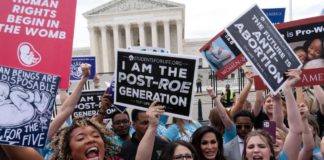
The brewing monkeypox outbreak that’s raising health alarms in the LGBTQ+ community comes on the heels of the still-mysterious long Covid being compared to HIV, with strikingly similar implications.
It all brings back disquieting memories of the early 1980s, neatly captured in an infamous New York Times headline: “Rare Cancer Seen in 41 Homosexuals”
Long Covid and monkeypox are very different diseases from HIV, but the lessons of the HIV/AIDS epidemic, many of them learned through suffering and death, can offer a pathway to better health care for everyone, including people with Covid, cancer, and even monkeypox.
advertisement
The early days of AIDS were marked by indifference at best and cruelty at worst, not just in U.S. politics, but even among doctors, many of whom wouldn’t treat people with AIDS. Instead, gay men got much of their care and solace from valiant nurses, some family, and their gay and lesbian friends.
Over the course of 15 years, before effective treatments came to market, they fought to put humanity into health care. They created an infrastructure that addressed the needs of the HIV/AIDS community. Names like Gay Men’s Health Crisis and Whitman-Walker in New York, Fenway Community Health Center in Boston, the AIDS Project Los Angeles, and others revolutionized LGBTQ+ health care.
advertisement
I remember the first time I had a medical appointment with a gay doctor. It wasn’t until I was about halfway through the visit that it dawned on me: I didn’t have to dance around the details of my health, my life, and my boyfriend. The fear of triggering bigotry from my doctor, which I had carried with me my whole life, suddenly evaporated.
Just as important, my doctor told me about the latest ways to protect myself from HIV and other kinds of issues facing gay men like me. This all sounds like common sense, but for me it was revelatory. I finally had the full weight of medical science in my corner.
My story isn’t much different from millions of other LGBTQ+ people. With caring doctors well-versed in the unique needs of our sprawling community, transgender people can more easily talk about transition options, lesbians can get screened for breast and other forms of cancer, gay parents have the freedom to get and be part of health care for their children, and so much more.
Speaking freely and openly about our lives got us the care we needed and it produced better “outcomes,” to invoke some powerful jargon.
But here’s the thing: Physicians and nurses integrating patients’ unique experiences into care isn’t just an LGBTQ+ thing. It’s an everybody thing. Everyone has special health needs and a need to speak candidly about everything that affects their health, even if it’s very personal.
With AIDS, the underlying barrier was fear and homophobia. But there are many other barriers that prevent individualized care, the most glaring of which is how the health system financially disincentivizes this kind of care. Instead, it prioritizes a glut of expensive and often low-value services rather than the smartest and best path for people to get and stay healthy.
A handful of medical groups and insurance programs around the country are trying to undo this perverse system by changing financial incentives to make the medical establishment more compassionate and effective. By changing the way doctors are paid, they can thrive by focusing on their patients as people, which ensures their patients are being cared for as people. That’s the same goal that was driving the early years of AIDS advocacy.
Take a new mom who may be dealing with postpartum depression. Her doctor recommends an antidepressant but she and her doctor don’t have time to talk in depth and she is breastfeeding and worried about the impact of a drug on her baby. There’s so much more the system could do for her. Medical practices that are part of new payment models that allow the integration of behavioral health into primary care services could offer her therapy with a mental health provider right in her doctor’s office, connect her with other moms who have similar depression, or begin a regime of short-term antidepressants that are safe for her and her baby.
It’s common sense to re-engineer the status quo, but it’s not happening fast enough. The country needs a national movement. The organization I lead, Families USA, calls this effort People First Care, something we are engaging our national and local network of health advocates to make a reality in health care centers everywhere.
The LGBTQ+ community knows how to make change, especially in health care. This might not be the kind of LGBTQ+ specific approach where advocacy leaders tend to put their energy, but using our community’s power and experience to benefit a wider swath of American families would be an extraordinary contribution.
LGBTQ+ people can help create a healthier and stronger nation and, at the same time, honor the AIDS advocates who, under incredible duress and stigma, led one of the most organized and effective fights for better and more humane health care in America.
Frederick Isasi is the executive director of Families USA, a nonpartisan, nonprofit health care advocacy organization.








